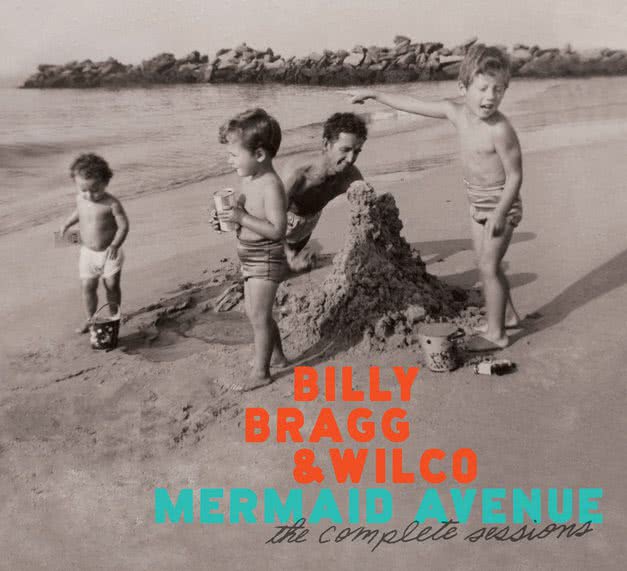If Woody Guthrie were still alive, this year would mark his one hundredth birthday. As such, commemorations will be held throughout the year by the myriad of Guthrie loyalists, including the collaboration New Multitudes, featuring My Morning Jacket’s Jim James, Will Johnson, Anders Parker and one former half of Uncle Tupelo, Jay Farrar.
The other half of Uncle Tupelo; Jeff Tweedy will again be paying homage to the memory of Woody Guthrie, with the all-inclusive new edition of Mermaid Avenue; the now three album, one movie collection of Billy Bragg and Wilco meditations on previously unused Woody Guthrie lyrics.
Initially released in 1998, Guthrie’s daughter Nora enlisted Billy Bragg, Jeff Tweedy and the late Jay Bennett to sift through three thousand sets of lyrics to try and reimagine the words of the world’s most revered folk icon for a new generation. The success of the collaboration was slightly undermined by tensions between Tweedy and Bragg, the former of which was weary of Bragg’s financial intentions regarding the project.
It did nothing to diminish the impact the sessions had; previous Guthrie fans revelled in the reworking, whilst an army of new listeners were turned onto Guthrie and his place at the end of a great musical lineage. Cuts from the first sessions still stand as highlights. ‘California Stars’ to this day serves as a live Wilco favourite, ‘Hoodoo Voodoo’ instils Guthrie’s words with an infectious energy; whilst Bragg compliments the celebratory air of ‘I Guess I Planted’ with a strut and a bounce.
The second sessions weigh heavily on Wilco material, which is fine. Throughout the collection, Bragg comes off as hit-and-miss, while Wilco remain ever consistent. ‘All You Fascists’ shows Bragg instilling Guthrie’s words with a great rock and roll flavour, however stands alone as Bragg’s great contribution.
‘Secret of the Sea‘ carries a pure Summerteeth-era Wilco energy; while ‘Someday Some Morning Sometime’ hints at the eccentricity which would mark their turn-of-the-century material; whilst ‘Remember the Mountain Bed’ is easily as devastating as any of Tweedy’s intimate moments. Jay Bennett’s input cannot be understated. He was as much an impact on the sounds of the songs here as he was the progression of Wilco’s sound. His sweet organ adorns ‘When the Roses Bloom Again’, his piano on ‘Listening to the Wind that Blows’ sounds as intrinsic to the group’s sound as Tweedy’s breathy voice.
Considering Jay Bennet passed away in the time between the previous Mermaid Avenue release and these final, complete sessions seems to do even more to reintroduce Bragg, Wilco and Guthrie to new audiences. It further highlights the shimmering qualities which make up pre-Yankee Wilco. It hints at a more spiritual side to Guthrie’s lyrics than the previous sessions, and it further asserts Bragg as one of Guthrie’s fiercest followers.
In the third instalment, along with the accompanying movie, we get even more of a sense of how the players approached the project. The third disc is spread heavy with intimate Billy Bragg interpretations, particularly how ‘Bugeye Jim’ moves along with some excellent slide guitar. There are plenty of moments which hint at the songs here being the least realised, however Bragg and Wilco are always engaging.
As a comprehensive collection, Mermaid Avenue: The Complete Sessions is exquisite. If it weren’t Woody Guthrie’s words as the building blocks for all this material, it would still be a stellar collection of songs between two of Guthrie’s true heirs. The fact that there is such a history to these folk songs makes it all the more enticing. It is the perfect project to bring his material to a twenty-first century audience, short of listening to the man himself.
In the accompanying film, Man in the Sand, Bragg takes it upon himself to search for “the spirit of Woody Guthrie”, whilst Tweedy seems fine to just serve the song rather than the historical or political significance of Guthrie, with a great sense of humour about the project. “I just think Woody would have picked the songs which didn’t suck.”

































